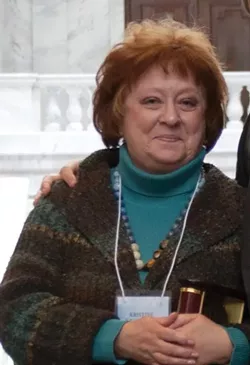
In May 2016, retired prosecutor Kristine Knowlton received the Mel Wilson Lifetime Achievement award. It was for "40 years fighting for victims," wrote two Utah Attorney General prosecutors in their nomination.
While victims' rights have improved to some degree in Utah in recent years, in part thanks to Knowlton's efforts and others who've pushed for more victim-focused services, recent revelations of how Brigham Young University has suspended or expelled rape victims for violations of its Honor Code, has underscored how far the Beehive State has yet to go.
During her career, Knowlton was a prosecutor who prefered to let her pleadings do her talking rather than give interviews. Eight months into retirement, she agreed to review areas of concern she'd like to see addressed in Utah's criminal justice system.
Knowlton, who began her career as a prosecutor in 1979 in Weber County's juvenile court, had a significant impact on numerous bills relating to victims' rights. Utah's director of the office on Domestic and Sexual violence, Ned Searle wrote in his award nomination letter that, "The cohabitant language, the dating violence protective order and countless other terms and language in endless bills were influenced by her through her many years of service." Knowlton's rewriting of the elder abuse statute, which had been largely unenforcable up until then, means it now covers physical abuse, neglect, financial and sexual exploitation. "The sad thing is they don't want to be moved out of their own home, they want the abuse to stop," Knowlton says.
As a prosecutor at the Utah Attorney General's office, which she joined in 1996, Knowlton pushed through legislation allowing victims to get a civil injunction against a stalker. That followed a case where a woman had been unable to get a protective order against a former boyfriend because they hadn't lived together. He subsequently shot her parents and then killed himself.
Knowlton has long championed protective orders, which some Republican legislators have repeatedly claimed were being abused by women to punish men. Most orders that are dismissed, she says, were because the abuser couldn't be served, not because a victim was lying. In a survey, she recalls nine out of 10 victims said the protective orders had helped them. "I know there's a myth out there they won't stop a bullet. Apparently it stops it in 89 percent of the time."
Knowlton served on the state's DV fatality review committee, which reviews all domestic violence homicides. Close to half of Utah's homicides from 2000 to 2013 were DV-related, with 2016 already having seen nine deaths. "What we found was that people didn't have protective orders who should have, people didn't know about the resources that were available and in cases where there were protective orders, defendants still had their guns," despite federal law requiring they have no access to weapons.
She calls for more victim advocates, more treatment for victims and more shelter beds, as shelters routinely have to turn away women seeking help. Knowlton also highlights the paucity of treatment for children who've witnessed domestic violence, and argues for evidence-based treatment not only for children and victims, but also offenders. "Just sticking them in a program, having them watch a film and telling them not to hit, doesn't mean that it works."
Her work with the Internet Crime Against Children task force showed her that while she initially supported mandatory sentences for federal child pornography crimes, she now favors "discerning sentencing," rather than automatic prison time. "You're looking at people, not categories," she says. What surprised her in state court were the number of child porn offenders from 17 into their early 20s who would be placed on the lifetime sex offender registry. She stresses the difference between a 19-year-old who looks at porn of naked teens as opposed to a 38-year-old man downloading medical porn involving the abuse of children. "I don't agree that one size fits all," she says. "That's not justice. There's got to be a better way."
One of the current buzz-phrases in criminal justice is human-trafficking. While advocates and law enforcement rarely agree as to the extent of the problem, or even exactly what the problem is, Knowlton highlights labor trafficking of children by extreme religious groups, but also underscores how little is achieved when there isn't a victim-centric approach to prosecution.
She cites a trafficking bust at a massage parlor, where the man and woman who ran the establishment were arrested, "and here were all these women who did not claim they were being forced to do this." With the man who had supplied them with living accommodation and money gone, they were stranded. "There was nothing for them. I think that's appalling to go in and implode a situation and have nothing for the victims. You can prosecute all you want, but if you don't have resources for these victims, it doesn't matter."